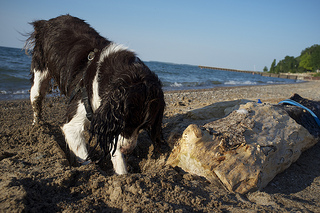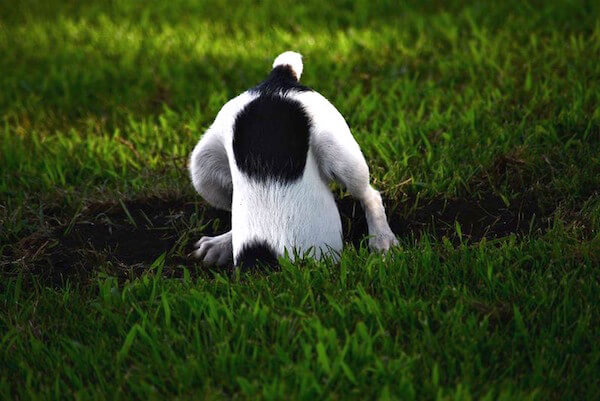Stop Dog Digging
Whether it's his new-found escape route under the fence, a means of hiding a favorite bone for later, or simply for the joy of following his nose, dogs have a penchant for digging.
That's great, you think. I knew that already. Just tell me how to STOP dog digging!
Contrary to what you may think, dogs don't dig out of spite. For most, it is simply a matter of burning pent-up energy or out of boredom.
Some breeds were specifically bred to dig - terriers for instance - so this activity comes quite naturally for them. You'll have to give him enough exercise that he won't feel the need to dig (or bark, chew, jump, etc).
Remember - a tired dog is an obedient dog. Without proper exercise, you'll end up with a dog that is full of pent-up energy, and he is going to find other creative ways to release it. Don't blame your dog... you are the one who chose that specific breed or energy level.
The Cure to Digging
As you've probably already heard me say before, the "secret" to solving any dog behavior problem is to catch them in the act.
Unfortunately, it's a bit trickier to stop dog digging as the dog is usually outside by himself when the digging happens. So let's look at what you can do...
First of all, give your dog the exercise his breed or energy levels require! At the risk of sounding like a broken record, I can't emphasize enough how important this is.
An under-exercised dog is bored, both physically and mentally. So your number one solution is going to be exercise. Digging IS a type of exercise, so if you don't want your dog to re-create the Grand Canyon in your lawn, give him enough alternative exercise!
 A spaniel enjoying a good dig on the beach.
A spaniel enjoying a good dig on the beach.Physical Exercise
Even before letting your dog have free reign in the backyard, take him for a good, long walk or jog to burn some excess energy. Be sure to incorporate obedience training in your walks, too, as this will help to exercise his mind (just as important).
Perhaps you have a high-energy dog, and a simple walk doesn't cut it. Teach him to play fetch! And I mean a controlled game of fetch, where the dog must sit and stay at your side until you command him to fetch, then bring it back, release the ball to you, and sit beside you again. Don't substitute fetch for a good walk, but do it in addition to your walks.
Not into fetch? Try rollerblading together, hiking, running, or going on a bike ride. Or start agility, fly ball, or some other dog sport. Something. Anything. Your dog needs this more than anything else!
If you feel like you are having trouble giving your dog the amount of exercise he or she needs, take the next step. Get yourself a doggie backpack, and have your pooch wear it on walks. Start with it empty.
Over time, begin adding weight to the backpack. Evenly place a couple of full water bottles in each side pocket. This will double the amount of exercise that your dog gets! If you have a larger dog, you can slowly add more weight as he gets stronger.
Mental Exercise
A lot of what I've suggested so far is physical exercise. While that's super important, you've got to remember that a dog needs mental stimulation just as much.
How can you go about increasing your dog's mental exercise?
- Fetch - like I mentioned earlier, fetch, as a controlled game, is great for both physical and mental exercise!
- Obedience training - If you don't already, you need to be training with your dog every day. This is the best way to tire your dog's mind, and will give you a great return on investment, too!
Not sure where to begin? My basic obedience training articles will give you something to get started on. - Games - Certain games like searching for an item are great for mental stimulation. It requires concentration, and many breeds will be naturals at it.
Let your dog sniff an item, then put them in another room. Go and hide the item somewhere (not too hard at first), then release your dog with a command like "Search".
Make sure you aren't hiding the toy where he needs to dig to get at it. It will inadvertently encourage that behavior, and make it harder to stop dog digging!
Using a Correction to Stop Dog Digging
Once you've assessed if your dog is getting enough exercise or not, you can decide whether you need to increase it. A dog that is not exercised enough will release that bottled-up energy in behaviors like digging, chewing, jumping on people, and nuisance barking.
As I mentioned at the beginning, if you are not there to catch your dog in the act, you can't effectively correct him to stop dog digging. That being said, if you do happen to be in the backyard with your dog and he begins to dig, give a sharp, firm verbal "Eh!" if there is no leash on.
If the digging tends to happen while you are outside with him, it's a great opportunity for you to correct! Put a collar and leash on (a 20 - 30 foot long line works great), letting it trail along behind your dog.
Keep your eyes peeled. When you notice him starting to dig, say nothing, give a fast, firm, pop on the leash (loosen, pop, loosen) to correct. You want the leash tight for only one second.
Don't say anything, otherwise you will only teach him not to dig when you are around as he'll associate the correction with you. You want him to think that it's his digging that is causing the correction, not you!
Your other option is to use an electronic remote training collar. Be sure to first learn how to properly fit and use this type of collar. There is always a desensitization period of about a week with the collar before you actually use it.
Again, if you put it on the dog and immediately start correcting with it, he will catch on very quickly that the correction is coming from the collar... ergo, a collar-trained dog (he'll only listen when the collar is on!).
With this method, the dog doesn't have to be on leash. When you notice the dog digging, press and hold the remote button for 2 seconds, while saying nothing. You guessed it - don't let him associate the correction with the person holding the remote, so say nothing. And of course, praise him when he stops!
With these solutions, you should be able to easily fire your backyard landscaper and stop dog digging. Always start with increasing the length or intensity of exercise as a first solution, and then go from there.
Good luck!
- Home
- Behavior Challenges
- Digging


